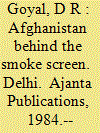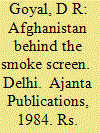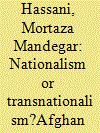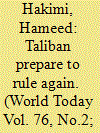| Srl | Item |
| 1 |
ID:
027732


|
|
|
|
|
| Publication |
DelhI, Ajanta Publications, 1984.
|
| Description |
viii, 314p.hbk
|
|
|
|
|
|
|
|
|
|
|
|
Copies: C:1/I:0,R:0,Q:0
Circulation
| Accession# | Call# | Current Location | Status | Policy | Location |
| 024897 | 958.1/GOY 024897 | Main | On Shelf | General | |
|
|
|
|
| 2 |
ID:
140162


|
|
|
|
|
| Publication |
DelhI, Ajanta Publications, 1984.
|
| Description |
viii, 314p.hbk
|
|
|
|
|
|
|
|
|
|
|
|
Copies: C:1/I:0,R:0,Q:0
Circulation
| Accession# | Call# | Current Location | Status | Policy | Location |
| 024970 | 958.1/GOY 024970 | Main | On Shelf | General | |
|
|
|
|
| 3 |
ID:
180023


|
|
|
|
|
| Summary/Abstract |
Relations between religion and nationalism, as two identity forms, has been debated in Muslim countries, especially where the nationalist trends coincided with the rise of religious reformation and Pan-Islamic movements. This article scrutinizes discourses on linking a transnational ideology of Pan-Islamism with Afghan nationalism in an early twentieth century nationalist newspaper, Seraj-ul Akhbar. The newspaper presents a unique case for this study since it was a platform for dissemination of both ideologies simultaneously. Unlike the later Muslim Brotherhood intellectuals and Muhammad Iqbal, Seraj-ul Akhbar authors did not see a contradiction between Pan-Islamism and territorial nationalism. They formulated a universal Muslim unity going through the national state structure, but not bypassing them. Meanwhile, Seraj-ul Akhbar appropriated the religious language for strengthening national unity. In this way, nationalistic and Pan-Islamic concepts were used to craft a nationally stable identity. It is argued that Pan-Islamism is not a unitary universal transnational ideology, rather it is often embedded in different national, language, and ethnic boundaries.
|
|
|
|
|
|
|
|
|
|
|
|
|
|
|
|
| 4 |
ID:
171593


|
|
|